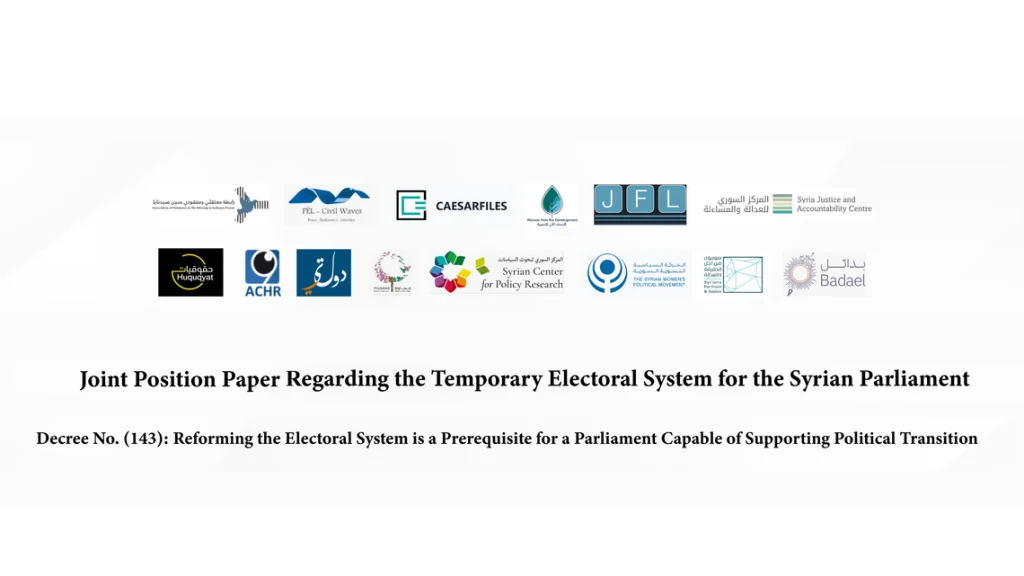Decree No. (143) of 2025, issued by the Transitional President of Syria regarding the temporary electoral system for the Syrian Parliament (the Syrian Parliament), is a pivotal document during this transitional phase. It was supposed to represent a major milestone on the path of political transformation following years of conflict and open the door to free and fair elections that reflect the will of the diverse components of the Syrian people. However, a close reading of its provisions reveals an electoral system plagued by deep structural flaws, rendering it far from meeting even the minimum international standards for political participation.
In this position paper, the undersigned Syrian organizations provide a critical human rights-based review of the decree and offer a set of recommendations.
First: Formation of the New Parliament
Decree (143) states that two-thirds of the Parliament members are elected through “electoral bodies” (Article 3, Paragraph 4), while the remaining third is directly appointed by the Transitional President (Article 38, Paragraph 5 of the decree and Article 24, Paragraph 3 of the Constitutional Declaration).
The decree also grants the president the authority to name replacements for any member who loses their seat due to death, resignation, or disqualification (Article 45). Thus, the president’s power extends beyond executive functions to statutory authority allowing him to practice direct influence over the Parliament’s composition.
This setup makes the Parliament susceptible to power balances not reflecting the voters’ will and undermines its intended representative nature, enabling the executive authority to dominate an institution that should be independent and reflective of the popular will.
In practice, giving the president the power to appoint one-third of the members, appoint the High Electoral Committee (which in turn selects two thirds of the members), and nominate replacements for elected members means that he can effectively shape a parliamentary majority composed of individuals he selected or ensured loyalty from. This risks turning the Parliament into a body with a single political color, undermining the principle of pluralism essential to any genuine democratic process.
Moreover, even the “elected” members are not chosen through a genuinely independent process but through a series of committees hierarchically linked to the High Committee appointed by the president (Articles 6, 8, 9, 11, 14, 23). This places the entire “electoral process”, if that term is applicable in the absence of genuine electoral conditions, under the president’s direct and indirect influence, rendering the elections symbolic at best, devoid of their democratic purpose of ensuring representation and accountability.
Second: Candidacy and Participation Conditions
The decree uses vague language that allows for selective and exclusionary interpretation. It disqualifies any person considered a “supporter of the former regime,” a member of “terrorist organizations,” or someone who advocates “separation, division, or reliance on foreign powers” (Article 21, Paragraph 9), without providing legal definitions or objective criteria for such terms. This transforms these conditions into tools in the hands of the executive to determine candidacy eligibility based on shifting political considerations rather than law. A key question arises: Who will decide whether these descriptions apply to candidates or members of the electoral bodies? And by what standards?
Similarly, the decree refers to categories such as ” The competent” and “Notables” and imposes specific educational requirements (Article 21, Paragraphs 14 and 15), but fails to define, for instance, who qualifies as a “notable.” This opens the door to the influence of wealth and personal connections in securing these designated seats.
While Article 24 of the decree mentions a minimum 20% quota for women, this percentage is low. Additionally, representation for women, displaced persons, persons with disabilities, and survivors of detention is phrased as “whenever possible,” making it advisory and non-binding. Thus, what should be a legal obligation to guarantee the participation of marginalized groups becomes a symbolic promise with no enforceable effect.
Third: The Executive Authority’s Role in Forming the Parliament
In any electoral process, the supervising body should be entirely independent from the executive to prevent manipulation. However, Decree (143) lacks this principle. The High Electoral Committee, which is the central authority overseeing the entire process (Article 6, Paragraph 2), is not elected or independently formed but appointed by the president. The decree grants this body wide powers (Article 1 of the decree and Article 24 of the Constitutional Declaration). Thus, the body responsible for ensuring election integrity becomes subordinate to the president rather than a neutral authority.
Likewise, the appeals committees, which are supposed to be the independent legal bodies resolving electoral disputes, are also tied to the executive. Judges on these committees are appointed by a decision from the executive authority (the Minister of Justice) (Article 15, Paragraph 3), in the absence of an independent judiciary. Their decisions are final and not subject to appeal (Article 15, Paragraph 5); there is no independent legal oversight and the system creates the risk of inconsistent rulings in similar cases with no mechanism to ensure consistency in legal standards.
The decree also allows for the possibility that members of the High Electoral Committee may join the Parliament after the election process as part of the third appointed by the transitional President (Article 39, Paragraph 7). This conflicts with the principle of election integrity, as the body supervising the elections should not become part of the entity it helps form. Such overlap invites bias, as the committee may select subcommittee members and electoral bodies aligned with its ideological or political views, rather than based on merit. This favoritism could be used to reward loyalty, with committee members seeking the president’s approval in hopes of being appointed later, turning the electoral process into a closed loop of mutual appointments that promote personal loyalty over public representation.
Fourth: Electoral Campaigning and Oversight
The decree limits electoral campaigning to the electoral body (Article 28, Paragraph 2), which prevents public discussion of political platforms and deprives society of open debate about candidates. Moreover, independent monitoring—an essential guarantee of election fairness—is not enshrined in the decree as a protected legal right. Instead, it is left to the discretion of the High Electoral Committee, which “may” invite some international organizations or diplomatic missions to observe the process (Article 50). Therefore, monitoring is not a mandatory obligation, but a privilege granted or withheld by the electoral authority under the president’s influence. As a result, monitoring shifts from a protected legal mechanism to a favor that may or may not be granted.
Fifth: Imposing Double Penalties for Electoral Offenses
The decree stipulates doubling penalties for any crime committed during or because of the electoral process (Article 43). This provision raises two major concerns:
First, in principle, the president does not have the authority to amend the existing law and double the criminal penalties in this way, as criminal legislation falls within the powers of the legislature.
Second, the vague wording may be used to criminalize activities related to freedom of expression, such as demonstrations or distributing campaign materials, making this provision a potential tool for suppressing participation instead of protecting election integrity.
Sixth: International Standards and the New Electoral System
The provisions of Decree (143) contradict the International Covenant on Civil and Political Rights (ICCPR) (Article 25), which guarantees every citizen the right to participate in public affairs and vote in free and fair elections based on equal suffrage. However, under decree (143), voting is not open to the public, but limited to select electoral bodies, the elections are not equal due to exclusionary conditions, and the executive maintains broad control over the formation of the Parliament and the management of the electoral process.
Similarly, the decree violates the Convention on the Elimination of All Forms of Discrimination Against Women (CEDAW) (Articles 2 and 7), as it fails to fulfill Syria’s obligations under CEDAW. Instead of full equality, it offers only a 20% quota for women, and the inclusion of women, displaced persons, persons with disabilities, and survivors of detention is to be fulfilled “whenever possible,” and is non-binding.
Thus, Decree (143) not only contradicts international standards and treaties but also violates the Syrian Constitutional Declaration, which recognizes all international treaties ratified by the state as an integral part of the declaration (Article 12).
Seventh: Recommendations
The undersigned organizations acknowledge the difficulty of holding direct general elections at this stage, given Syria’s fragile and complex situation and the displacement of millions. However, we emphasize the need to reconsider the temporary electoral system to make it more inclusive, balanced, respectful of the separation of powers, and capable of enabling the transitional Parliament to fulfill key tasks, including preparing for the election of a constitutional drafting committee and paving the way for presidential, legislative, and local elections via direct vote.
Accordingly, the undersigned organizations recommend the following to the Syrian transitional authorities, particularly the Presidency and the High Electoral Committee:
- Eliminate the transitional president’s role in appointing one-third of the Parliament members.
- Reconstitute electoral bodies in consultation with Syrian civil society and all active political forces across Syria to ensure inclusive representation.
- Remove vague and restrictive candidacy conditions in Decree (143), retaining only clear and objective criteria such as age and legal capacity.
- Guarantee effective and mandatory representation for marginalized groups, including women, displaced persons, persons with disabilities, and survivors of detention, through clear and binding provisions.
- Establish a body that is genuinely independent from the executive to supervise the electoral process, with neutral, multi-level judicial oversight.
- Ensure freedom of electoral campaigning in public spaces and enshrine domestic and international election monitoring as a legal right, not a discretionary choice.
- Repeal the article that doubles penalties for electoral crimes, adhere to the current Syrian Penal Code, and adopt precise definitions to prevent the misuse of the election decree against freedom of expression.
- Align the electoral system with international human rights treaties and agreements ratified by Syria, which are now part of the Constitutional Declaration, thereby guaranteeing every citizen’s right to political participation and equal suffrage.
Signatory Organizations:
- Syrian Center for Justice and Accountability (SJAC)
- Justice for Life (JFL)
- Syrians for Truth and Justice (STJ)
- Caesar Files for Justice (CF4J(
- Access Center for Human Rights (ACHR)
- Musawa
- Huquqyat
- Badael
- PÊL- Civil Waves
- Association of Detainees and The Missing in Sednaya Prison (ADMSP)
- Women Now for Development
- Syrian Center for Policy Research (SCPR)
- The Syrian Women’s Political Movement
- Dawlaty



